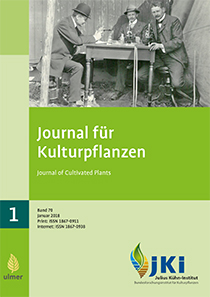The phytomedical challenges in the life of Otto Appel: An overview of his scientific work on the occasion of his 150<sup>th</sup> birthday
DOI:
https://doi.org/10.5073/JfK.2018.01.02Keywords:
Fusarium, common bunt, potato diseases, hot water treatmentAbstract
Otto Appel (1867–1952) was a passionate plant pathologist. In his younger years he earned special merits as a scientist and later as an organizer of the plant protection service in Germany. In memory of his 150th birthday, his scientific contributions and achievements in plant pathology will be recalled. Otto Appel was a pioneer of his time in many respects. Using appropriate scientific approaches he developed solutions for specific problems in plant pathology, some of which are still valid today. After studying pharmacy and botany followed by two short-term research stays in microbiology at the universities of Würzburg and Königsberg, Otto Appel arrived at the Biological Department of Agriculture and Forestry of the Imperial Health Office in Berlin on June 1, 1899. His main focus was on the plant health of potatoes and cereals, the most important food crops in Germany during that time, but his overall work experience was much broader. He developed methods for the healthy storage of potatoes and seed treatments of cereals to combat fungal diseases. He described fungal pathogens and developed procedures for a standardized culture of Fusarium allowing precise identification. Furthermore, Otto Appel studied in detail the biology of various pathogens in order to identify targets for their control. Overall, the phytopathological achievements made by Otto Appel significantly shaped agricultural practice and enhanced food safety and quality in Germany and beyond.
Downloads
Published
Issue
Section
License
The content of the journal is licensed under the Creative Commons Attribution 4.0 License. Any user is free to share and adapt (remix, transform, build upon) the content as long as the original publication is attributed (authors, title, year, journal, issue, pages).
The copyright of the published work remains with the authors. The authors grant the Journal of Cultivated Plants, the Julius Kühn-Institut and the OpenAgrar repository the non-exclusive right to distribute and exploit the work.







